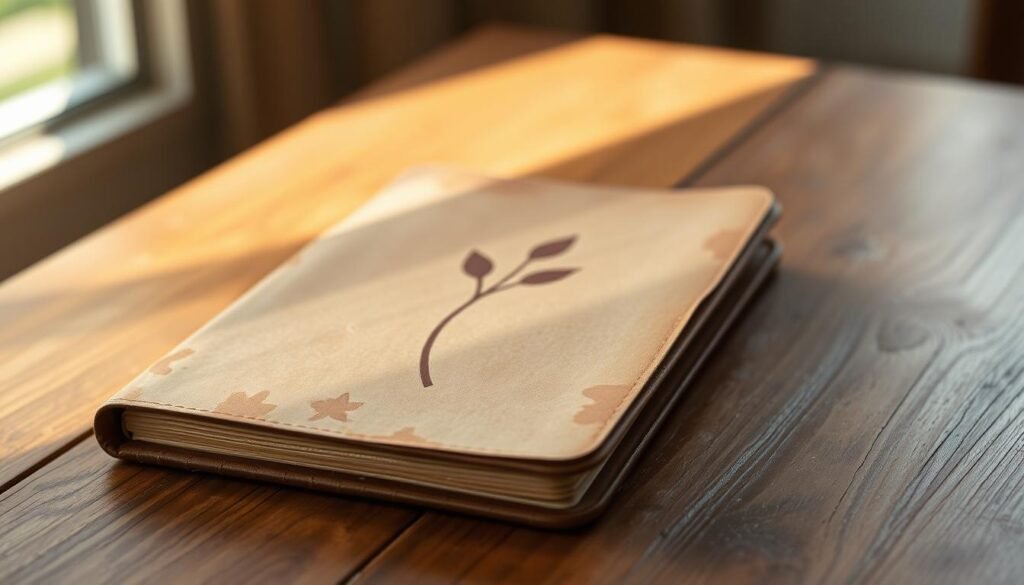Have you ever wondered if focusing on the good in your life could truly make a difference? Many of us hesitate to try practices like a gratitude journal because they can feel overly sentimental or forced. But what if there was a way to make it meaningful and authentic?
We’ve designed a structured approach that avoids the “cheesy” factor. It’s simple, practical, and backed by science. All you need is a pen and paper or a digital note-taking app. This method is accessible to anyone, no matter how busy your schedule might be.
Research, like Anna LeDonne’s 2019 case study, shows that consistent gratitude practices can lead to measurable mindset shifts. By combining science-backed methods with real-world application, we’ve created a framework that fits seamlessly into your daily routine.
Ready to take on the challenge? Let’s explore how focusing on the things grateful can transform your perspective and enhance your life.
Key Takeaways
- Structured practices can make gratitude feel authentic and meaningful.
- No need for fancy tools—pen, paper, or digital notes work perfectly.
- Science-backed methods ensure measurable mindset shifts.
- Anna LeDonne’s 2019 study highlights the benefits of consistent practice.
- Practical framework designed for real-world application.
Why Start a 30-Day Gratitude Journal?
What if a simple daily habit could reshape your outlook on life? Research by Robert Emmons shows that just 1-3 weeks of consistent practice can improve physical health, psychological well-being, and social connections. It’s a way to rewire your brain for positivity, one day at a time.
Modern society often leans into negativity bias, focusing on what’s wrong rather than what’s right. Gratitude acts as a corrective tool, helping us shift our attention to the good in our life. This small change can have a big impact on how we feel and interact with others.
Rachel, a participant in Emmons’ study, noticed a significant shift in her mindset. She moved from a scarcity mindset to one of abundance, appreciating the little things she once overlooked. This shift is backed by science—consistent practice strengthens neural pathways associated with optimism and joy.
With rising mental health concerns among US adults, journaling offers a proactive challenge to build emotional fitness. It’s not just about feeling better; it’s about creating a healthier, more resilient mindset. Start today and see how focusing on gratitude can transform your perspective.
The Science Behind Gratitude Journaling
Ever thought about how focusing on the positives could change your health? Science shows that gratitude journaling isn’t just a feel-good practice—it has measurable effects on your body, mind, and relationships. Let’s dive into the research-backed benefits.
Physical Health Benefits
Gratitude journaling can significantly improve your physical health. Studies reveal that consistent practice leads to a 23% reduction in cortisol levels, the stress hormone. Lower cortisol means less inflammation and a stronger immune system.
Additionally, participants in Robert Emmons’ research experienced a 7% drop in blood pressure. This reduction can lower the risk of heart disease and improve overall cardiovascular health. Reflecting on the good in your life might just be the health boost you need.

Psychological Benefits
When it comes to psychological wellbeing, gratitude journaling shines. After 30 days of practice, participants reported a 25% increase in happiness scores. This boost is linked to the release of dopamine, the brain’s “feel-good” chemical.
Pre-bedtime reflection has also been shown to improve sleep quality. By focusing on positive experiences, you reduce stress and anxiety, making it easier to drift off. A well-rested mind is a happier mind.
Social Benefits
Gratitude doesn’t just benefit you—it impacts those around you too. Journalers are 31% more likely to help others compared to non-journalers. This behavior is tied to mirror neuron activation, which strengthens social bonds.
A UCLA study found that gratitude enhances workplace collaboration. Teams that practice appreciation exercises report higher levels of trust and teamwork. Gratitude fosters a sense of community and mutual support.
How to Start Your 30-Day Gratitude Journal
Starting a daily habit of reflection can seem daunting, but it’s simpler than you think. With the right tools and mindset, you can create a routine that feels natural and rewarding. Let’s explore how to get started.
Choosing the Right Journal
Anna LeDonne recommends physical notebooks for a more tactile experience. They help you disconnect from screens and focus on the moment. But which type is best for you?
Bullet journals offer flexibility, allowing you to customize your entries. Guided templates provide structure, ideal for beginners. Blank notebooks give you complete freedom to express yourself.
If you prefer digital tools, apps like Aligned Life Design offer free starter templates. These are perfect for tech-savvy users who want convenience. The key is to choose what feels right for your lifestyle.
Setting a Routine
Consistency is the secret to success. Pair your journaling with existing habits to make it stick. For example, write while enjoying your morning coffee or before bedtime.
Some people worry they don’t have enough time. But even five minutes every day can make a difference. Start small and build from there.
Morning journaling sets a positive tone for the day. Evening reflection helps you unwind and process your thoughts. Experiment to find the best time for your practice.
By integrating journaling into your routine, you’ll create a habit that feels effortless and rewarding. Start today and see the impact it can have on your life.
30 Gratitude Prompts to Get You Started
Looking for fresh ways to appreciate the little moments in life? We’ve curated 30 unique prompts designed to spark genuine reflection and help you focus on the things grateful. These prompts avoid clichés and offer unexpected angles to deepen your practice.
Start with sensory appreciation. On day 2, ask yourself, “What scent or sound brought me joy today?” This simple question can help you tune into the beauty of everyday experiences. For relationship focus, on day 7, reflect on, “What did a loved one do today that made me smile?”
Self-reflection is equally important. On day 20, consider, “What mistake led to positive growth?” This prompt encourages you to see challenges as opportunities. Anna LeDonne’s example of gratitude for her cat demonstrates how even small, personal connections can bring depth to your practice.
Don’t shy away from unexpected angles. On day 30, explore, “How has technology improved my life?” This prompt helps you appreciate modern conveniences often taken for granted. For added depth, try combining prompts with photo documentation or using the “5 Whys” technique to drill deeper into your reflections.
These prompts are designed to make your practice meaningful and engaging. Whether you’re reflecting on a person, a moment, or an experience, each day offers a new opportunity to focus on the things grateful. Start today and see how these prompts can transform your perspective.
Tips for Maintaining Your Gratitude Journal
Maintaining a reflective practice is easier when you have the right strategies. We’ve gathered practical tips to help you stay on track and make this habit a natural part of your routine. Whether you’re new to journaling or looking to refine your practice, these ideas will keep you motivated.
Start Small
When beginning, it’s best to start small. Rachel, a participant in Robert Emmons’ study, found joy in simple things like her comfy pants or a chocolate bar. These micro-gratitudes can help you build momentum without feeling overwhelmed.
On busy days, aim for a three-sentence minimum. This rule ensures you stay consistent without adding pressure. If writing feels challenging, try voice memos as an alternative. Verbal processors often find this method more natural and engaging.
Be Consistent
Consistency is the key to making this practice stick. Calendar blocking can help you carve out time every day. Pair journaling with an existing habit, like your morning coffee or bedtime routine, to make it seamless.
For accountability, consider using Instagram templates or joining the #GratefulGroundedChallenge. Sharing your journey can inspire others and keep you motivated. Remember, it’s okay to miss a day—reframe these moments as opportunities for discovery rather than failures.
- Use calendar blocking to schedule your practice.
- Pair journaling with daily habits for consistency.
- Join challenges like #GratefulGrounded for accountability.
- Reframe missed days as learning opportunities.
By following these tips, you’ll make life easier and your practice more enjoyable. Start today and see how small, consistent steps can transform your routine.
The Impact of Gratitude on Your Life
How does consistent reflection influence your decision-making skills? Anna LeDonne’s research shows that participants who practiced daily reflection improved their ability to handle conflicts and make better choices. This shift isn’t just temporary—it leads to lasting changes in how you approach challenges.
Over time, gratitude rewires your brain. Studies reveal that 30 days of practice can strengthen neural pathways associated with positivity. This changes way you perceive stress and setbacks, making you more resilient in the face of adversity.

Beyond personal growth, gratitude impacts your professional life. Participants reported higher career satisfaction and improved teamwork skills. By focusing on the positives, you foster a sense of connection with colleagues, enhancing collaboration and trust.
Financial mindfulness is another surprising benefit. Reflecting on what you have reduces impulsive spending and encourages thoughtful budgeting. This shift in mindset can lead to healthier financial habits and long-term stability.
During crises, gratitude enhances emotional regulation. It helps you stay grounded and focused, even in challenging situations. This skill is invaluable for maintaining mental clarity and making sound decisions under pressure.
Finally, gratitude creates a ripple effect in your community. When you express appreciation, it inspires others to do the same. This shared practice fosters a culture of kindness and mutual support, amplifying the benefits for everyone involved.
By integrating gratitude into your daily routine, you’ll notice profound changes in how you feel like and interact with the world. Start today and experience the transformative power of focusing on the good in your life.
Sharing Your Gratitude Journey
Ever considered how sharing your reflections could deepen your practice? When we open up about our experiences, it not only strengthens our own mindset but also inspires those around us. Here’s how you can share your journey in meaningful ways.
Start by setting personal boundaries. Not every reflection needs to be shared publicly. Aligned Life Design’s private Zoom sessions and message groups offer a safe space to connect with like-minded people. This ensures your sharing feels comfortable and secure.
Transform your entries into thank-you notes. Whether it’s a handwritten letter or a quick text, expressing love and appreciation can deepen your relationships. This simple act turns personal reflection into a gift for others.
Create family gratitude rituals. Dedicate a few minutes each week to share what you’re thankful for. This builds a culture of appreciation and strengthens family bonds. Over time, these moments become cherished traditions.
Use social media mindfully. Join challenges like #GratefulGrounded to share your journey with a broader community. Remember, authenticity matters more than perfection. Your story could inspire someone else to start their own practice.
Finally, conduct an annual gratitude review. Reflect on the past month or year to see how far you’ve come. This helps you recognize patterns, celebrate growth, and set intentions for the future.
By sharing your journey, you not only enrich your own experience but also create a ripple effect of positivity. Start today and see how opening up can transform your life and the lives of those around you.
Conclusion
Taking the first step toward positive change can feel daunting, but it’s worth the effort. Committing to a 30-day practice is a way to build habits that lead to lasting transformation. Once you’ve completed the initial challenge, consider exploring advanced techniques like gratitude mapping or integrating mindfulness practices.
To support your journey, download Anna’s resource packet for additional tools and insights. Revisit the prompts quarterly to uncover fresh perspectives and keep your practice dynamic. This approach ensures continuous growth and deeper appreciation for the good in your life.
Remember, happiness is self-authored. By focusing on what you’re thankful for, you create a foundation for a more fulfilling way of living. Start today and see how small, consistent steps can lead to profound change.
FAQ
What is the purpose of starting a gratitude practice?
A gratitude practice helps shift your focus to the positive aspects of life, improving mental well-being and fostering a sense of contentment. It encourages mindfulness and can enhance relationships by making you more appreciative of others.
How does journaling improve mental health?
Journaling allows you to process emotions, reduce stress, and gain clarity. Writing down what you’re thankful for can rewire your brain to focus on positivity, reducing anxiety and boosting overall happiness.
Can I use any notebook for this practice?
Yes, any notebook works, but choosing one that feels special to you can make the experience more meaningful. Some prefer guided journals with prompts, while others enjoy the freedom of a blank page.
How long should I spend journaling each day?
Even 5-10 minutes daily can make a difference. The key is consistency, not the amount of time spent. Focus on reflecting deeply on what you’re grateful for rather than rushing through it.
What if I can’t think of anything to write?
Start small. Reflect on simple things like a good meal, a kind gesture, or a moment of peace. Over time, you’ll find it easier to notice and appreciate the little things in life.
Can gratitude journaling improve relationships?
Absolutely. Acknowledging the positive qualities of others and expressing appreciation can strengthen bonds and foster deeper connections. It also helps you approach conflicts with a more open and understanding mindset.
Is it okay to repeat the same things I’m grateful for?
Yes, repetition is fine. It’s natural to feel thankful for the same people or experiences. What matters is the genuine feeling of appreciation, not the novelty of the entry.
How can I stay motivated to journal every day?
Set a specific time for journaling, like morning or before bed. Pair it with an existing habit, such as drinking coffee or brushing your teeth, to make it a seamless part of your routine.
Can children benefit from gratitude journaling?
Yes, it’s a great way to teach kids mindfulness and positivity. Encourage them to write or draw about things they’re thankful for, helping them develop a habit of gratitude early in life.
What if I miss a day?
Don’t stress. Simply pick up where you left off. The goal is progress, not perfection. Missing a day doesn’t diminish the benefits of the practice.



